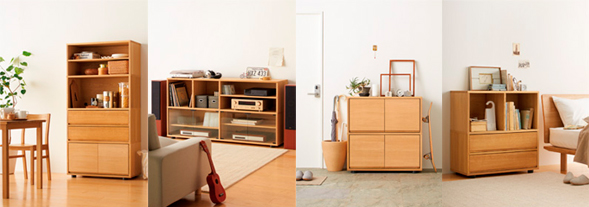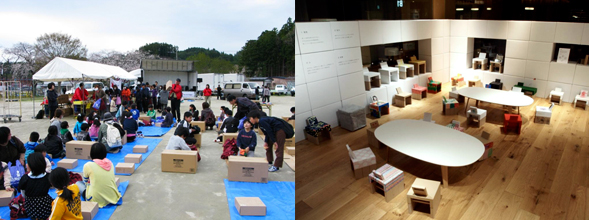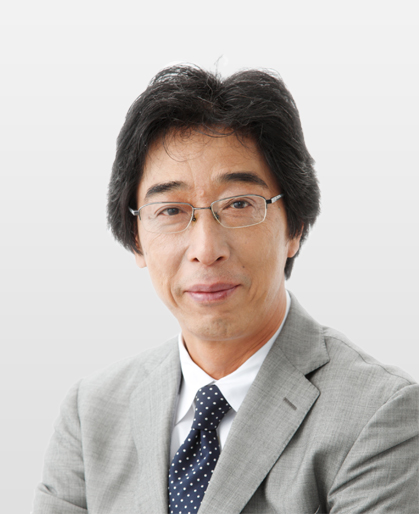President Masaaki Kanai is the President and Representative Director of Ryohin Keikaku Co., Ltd. Since his career at Seiyu, he has been involved in “MUJI” in the fields of Sales and Merchandising. Since August 2006, he was Chairman of IDEE Co., Ltd. and later assigned as President and Representative Director of IDEE in September 2009. He is working on improving the corporate value of the Ryohin Keikaku group companies.
The Columnist interviewed him about MUJI’s design philosophy and his opinions on the value of objects in society today. This interview was originally conducted in Japanese and was translated into English.
The Columnist (TC): Can you tell us about the philosophy of MUJI and your message ‘Back to our origins, into the future’?
President Masaaki Kanai (MK): There is no answer to this question even in MUJI itself. In this day and age, we are always questioning what is ‘MUJI’, and searching for what makes a good product. For this, we are constantly reflecting on the origin of things, and thinking of what will become of our future.
TC: Do you mean that MUJI’s message of ‘Back to our origins, into the future’ is more of a question to the public?
MK: It is not a question. We thought of this message together with our customers. What do you say to consumers? What do you do for the people in the world? Our goal is to serve our customers.
TC: How about your own opinions on what you define as “origins” and what will become of our future?
MK: What is wealth? What is “Creating a Pleasant Life”? I think the same for our origins and our future. (Editor’s Note: “Creating a Pleasant Life” is one of MUJI’s corporate beliefs)
TC: How does MUJI seek to impact people’s lives through its products?
MK: First and foremost, we reflect on the value of monozukuri (making products) in MUJI. At the same time, we present our own way of thinking about the value of objects to our consumers. We would like to inspire our consumers to think of the relationship between human beings and monozukuri in life. This is what we hope to achieve.

MUJI stacking cabinet designed to enable people to freely stack the cabinet according to their needs.
TC: Can you explain to us the meaning of mono?
MK: There are always things around us in life. What kind of things you choose to live with; these things represent the life and values of a person.
TC: As MUJI emphasises on simple living, MUJI creates products that are not different from one another. Imagine a world where there are only MUJI products, will there still be individuality for the consumers? Do you think consumer individuality is important?
MK: I feel that individuality is extremely important. It is for the purpose of individuality that we create products without personality as much as possible. With our products, we hope to give consumers a blank space and stimulate their imagination. When you incorporate your own taste and art, it becomes a product line which does not interfere with the consumer’s individuality.
TC: MUJI began with a “No Brand” policy which continues till today. MUJI now has presence in more than 20 countries and there are MUJI fans all over the world. Don’t you think that MUJI has become a brand now despite its “No Brand” corporate philosophy?
MK: Until today, we are recognised as being ‘no brand’ and we are still maintaining this policy. However, we are also aware that in every country, we are acknowledged as a brand. We are denying ourselves about the fact that we are relying on the brand of ‘MUJI’ to do business. As a company, we still have to use the label of ‘MUJI’. Despite this, our products are not labeled with a brand and are still considered ‘no brand’.
TC: Do you think that MUJI products will still enjoy the same popularity if they are sold without the MUJI brand. For example, if MUJI products are not sold in a MUJI store.
MK: Our trademark is that we eliminate commercialism. If Muji products are not sold in a Muji store, I feel that it will probably not sell. What we hope to communicate to consumers is essential objects without commercialism, by using only space, music, communication and also via the online platform.
TC: Which means that the importance of a MUJI store is how it is designed. This is shown in its space, music and communication. In this case, if these elements are present without the MUJI logomark on the store, do you feel that MUJI products will still sell?
MK: Yes. In the beginning, we disliked the fact that we became a brand. We didn’t label our product. The problem with brands today is that they label their products etcetera.
TC: Can you tell us about MUJI’s approach to Corporate Social Responsibility (CSR)?
MK: I feel a little uncomfortable to think of Corporate Social Responsibility (CSR) as a separate entity. Corporate business, in itself, exists because of society. Therefore, we do not think of CSR as a separate strategy.

Workshop activity for children and parents held at Fukushima. MUJI aims to promote the use of recycled materials to create paper tube chairs which leaves no garbage behind.
TC: In this case, how does MUJI incorporate CSR in their everyday operations?
MK: We incorporate the concept of having a critical mind and a conscientious behaviour within our fundamental way of thinking.
TC: Can you share with us your thoughts on packaging from convenience stores such as Family Mart and Lawson?
MK: It is known to many that packaging is built for the purpose of handing products over to consumers properly. However, manufacturers place their own products on store shelves with the hopes of competing against one another. Unfortunately, they do not stand out. On these store shelves, MUJI holds a small chance as our focus is not in competing in the packaging war.
TC: Can you explain to us how does MUJI support the Institute for Khmer Traditional Textiles (IKTT)?
MK: We don’t have an objective in supporting IKTT. To create a pleasant life, I feel that the preservation of IKTT is necessary. We would like to pass down these traditional techniques for future generations.
TC: As the President of MUJI, what is challenging in designing products that have reduced environmental impact? What about packaging design?
MK: Natural, simple, less materials and long-lasting.
TC: People become more wasteful with every new generation as they seek fanciful rather than functional products. How do you inculcate MUJI’s “less waste” mindset in your children? [OR] If you have children, how would you inculcate MUJI’s “less waste” mindset in your children?
MK: If I have a family, I think I would naturally impart MUJI’s “less waste” mindset to them.
TC: Can you elaborate on how you hope to inculcate MUJI’s “less waste” mindset in others? For example, what kind of practices will you inculcate?
MK: I do not have the mindset of “inculcating”. Every single day, the debate of what creates a pleasant life takes place in the MUJI Laboratory for Living.
TC: How do you think the 2011 Tohoku earthquake and tsunami has affected society and consumer culture in Japan? Please share with us your thoughts on this.
MK: This has made us reflect on what we can do in order to not turn a blind eye to problems which lie ahead, not just today but also in the future.
This interview was conducted for The Columnist, a newsletter by Consulus that offers ideas on business, design and world affairs. The views expressed in this article are those of the interviewee and do not necessarily reflect the views of Consulus.
———–
物の価値観を再考する:無印良品
金井政明社長は株式会社良品計画の代表取締役社長でございます。西友時代より「無印良品」に関わり一貫して営業、商品分野を歩む。2006年8月からはグループ子会社株式会社イデーの取締役会長、2009年9月代表取締役社長に就任。良品計画グループ全体の企業価値向上に取り組む。The Columnist は金井社長に、無印良品の設計理念と今日の社会の中で物の価値のかかわりについて聞きました。
The Columnist (TC): 無印良品の企業理念と「くりかえし原点、くりかえし未来。」のメセージを説明していただけませんか。
金井社長:無印良品には答えはありません。いつもその時代のなかで‘無印’とはなにか。‘良品’とは何かを探しています。そのためにいつも原点を考えながら、そしてまたこの先の未来がどうあるべきかを考え続けているということです。
TC: つまり、無印良品の「くりかえし原点、くりかえし未来。」のメセージはより公衆へ質問があることを意味するのでしょうか。
金井社長: 質問ではありません。お客様と一緒に考える場名のです。生活者に何を言うかから、人々(世の中)のために何をするのか。目指すところは最良の生活者です。
TC: 金井社長は原点が何かとこの先の未来がどうあるべきかどう考えるとお思いになりますか。
金井社長:豊かさとは何か?「感じ良い暮らし」とはどんなことか?原点も未来も同じかと思います。(訳注:「感じ良い暮らし」とは 無印良品の企業理念の一つであります)
TC: 無印良品の製品とは、どのように人々の生活に影響を与えますか。教えていただけませんか。
金井社長: 無印良品はまず自分たちがモノの価値を考えながら、お客様に物の価値について私たちの考え方を提示しています。生活におけるモノと人間との関係を考えるキッカケや意識をお客様に持ってもらえることが私たちの理想です。
TC: モノの意味を説明していただけませんか。
金井社長: 生活の中でモノは必ず存在しますが、どういうモノと暮らすかという点でモノとはその人の価値観であり、人生です。
TC: 無印良品はシンプルな生活を強調するように、無印良品で互いに異なっていない製品を作成しています。無印良品の製品だけが存在する世界を想像し、まだそこに消費者のための個性のことがありますか。消費者の個性は大切なこととお思いになりますか。ご自分の意見を教えていただけませんか。
金井社長: 自分らしさは大変重要です。そのため私たちの商品そのものは極力、個性を出さず、お客様の想像力を刺激する余白を持たせています。アートなどお客様の好みを取り入れる時に邪魔にならない商品群です。
TC: 無印良品は「ノーブランド」の商品発想をはじめ、この商品発送は今でも継続されています。今無印良品は20カ国以上に存在感が確立しているし、無印良品のファンもいらっしゃっています。無印良品の「ノーブランド」企業理念にもかかわらず、無印良品が今ブランドとなっているとお思いになりませんか。ご自分の意見を知らせていただけませんか。
金井社長:今もノーブランドという認識でいます。各国ではブランドとして認知されていることは承知しています。しかし、私たちが無印良品(MUJI)というブランドにたよったビジネスをするということは自己否定になります。
TC: 無印良品のブランドなしで販売されている場合で、無印良品の製品は依然として人気であるとお思いになりますか。たとえば無印良品の製品は無印良品の店舗で販売されていない場合。ご自分の意見を知らせていただけませんか。
金井社長:無印良品はコマーシャリズムを省いているのが特徴で、無印良品の店舗ではない場所で販売しても、おそらくそれほど売れないと思います。無印良品はコマーシャリズムのない本質的な商品を、空間、音楽、コミュニケーション、WEBの環境によってのみ、お客様に伝わるのだと思います。
TC: つまり、無印良品の店舗の重要性はそれが設計されている方法であることを意味します。これは空間、音楽、コミュニケーション、WEBの環境に示されています。そういった場合は、これらの要素が存在していても、店舗で無印良品ブランドのロゴなしである場合は、無印良品の製品は依然として人気であるとお思いになりますか。ご自分の意見を教えていただけませんか。
金井社長:はい。発売当初はブランドになることがいやで商品タグにもロゴは使用しませんでした。商 標の問題で現在はタグ等にロゴを入れています。
TC: 企業として社会的責任(CSR)への無印良品のアプローチについて教えていただけませんか。
金井社長:企業として社会的責任(CSR)を特別に考えること自体に少し違和感を感じます。企業そのものが社会のために存在していることが前提だと思います。私たちは特別、CSR という言葉として発しないようにしています。
TC: もしそうなら、無印良品はどのように日常業務にCSRを組み込むのでしょうか。
金井社長:私たちの基本的思考の中に批判的精神と良心的行動という概念が存在しています。
TC: ファミリーマート、ローソンなどのコンビニから包装についてどうお思いになりますか。ご自分の意見を知らせていただけませんか。
金井社長:包装はお客様に正しく商品を手渡すために必要なものです。しかし、各メーカーは自社の商品が店内(棚)で目立たないといけないという競争の中での宿命を持ってしまっていることに無印良品のチャンスが眠っています。
TC: クメール伝統織物研究所を支えるため、無印良品の役割は何でしょうか。
金井社長:クメール伝統織物研究所を支えるのが目的ではなく、感じ良いくらしのためにクメール伝統織物研究所の力が必要だと考えました。伝統的な技術は後世まで残したいという思いもあります。
TC: 無印良品の社長として、環境への影響を減らした製品を設計するための課題は何でしょうか。教えていただけませんか。パケージデザインについてはどうでしょうか。
金井社長:自然、シンプル、少アイテム、ロングライフ
TC: すべての新しい世代では人々は機能的な製品を求めていなくて、その代わりに美しい製品を求めています。ご自分の子供にどのように無印良品の「廃棄物を減らす」という考え方を教え込むのでしょうか。(もしくは)子供を持っている場合、どのようにご自分の子供に無印良品の「廃棄物を減らす」という考え方を教え込むのでしょうか。
金井社長: 意識したことはありません。家族であれば自然に伝わると思います。
TC: 他の人に無印良品の「廃棄物を減らす」という考え方を教え込む方法を詳しく述べていただけませんか。たとえば、どのような訓練を教え込むのでしょうか。ご自分の意見を教えていただけませんか。
金井社長:「教え込む」という考え方は持っていません。何が感じ良い暮らしかという議論はくらしの良品研究所の中で常に行われています。
TC: 2011年の東北地方太平洋沖地震は、どのように日本の社会や消費者文化に影響を与えるとお思いになりますか。 ご自分の意見を知らせていただけませんか。
こちらのインタビューは 「 The Columnist 」を行いました。「 The Columnist 」はビジネス、デザインと世界情











